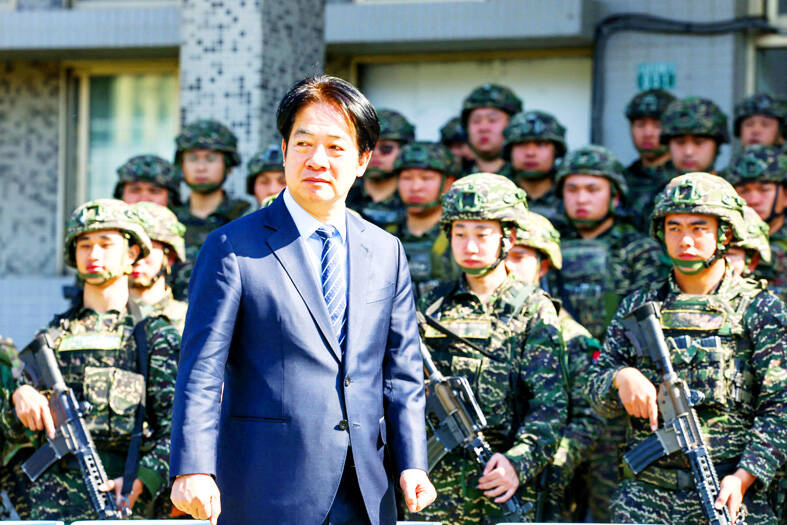As cases of Chinese espionage emerge, Taiwan must respond by “depoliticizing” the issue and recognize the fact that anyone could potentially become a spy for China, an analyst told a seminar in Washington on Thursday.
There is a need to “recognize that anyone can be a victim. Anyone can make that choice. It doesn’t matter where they come from,” Peter Mattis, a former CIA counterintelligence analyst, said at the event organized by the Global Taiwan Institute.
People who worked for the Chinese Nationalist Party (KMT) and national security organizations, as well as people on the Democratic Progressive Party side “have chosen to spy for some reason or another,” Mattis said, citing a case of alleged espionage involving a former assistant who worked for National Security Council Secretary-General Joseph Wu (吳釗燮) during Wu’s time as Minister of Foreign Affairs from 2018 to last year.

Photo: Cheng I-hwa, AFP
“This is why, to me, it is a tragedy that you have an aide to Wu, or that you have someone who worked in the Legislative Yuan for so long, who was spying for the CCP [Chinese Communist Party],” Mattis said.
Whether it is “a blue spy, green spy, white spy, it doesn’t matter what kind of spy, as long as it hurts Taiwan, it’s a good spy,” he said, an apparent reference to the “cat theory” of former Chinese leader Deng Xiaoping (鄧小平), a pragmatic economic philosophy that can be summarized as: “it does not matter whether a cat is black or white, as long as it catches mice.”
Taiwan should handle the spying situation with great caution, and establish objective standards of behavior and security procedures that “allow people to have a clear set of expectations, what’s acceptable, what’s not, and also the rules to remove people from sensitive positions,” Mattis said.
Besides the issue of espionage, he raised concerns about Chinese military exercises at a range in Inner Mongolia that simulated the surroundings of the Presidential Office in Taipei.
The CCP has been placing a persistent focus on Taiwan’s military police command and, therefore, presidential security, he said.
“This, to me, is quite concerning, because there is an importance of a national leader, and this is a very clear and deliberate effort to make sure that they have real-time awareness of the president’s security detail,” he said.
Other key speakers at the two-hour seminar, titled “Enhancing US-Taiwan Cooperation in Countering the CCP’s Ideological Work and Political Warfare,” included Mike Studeman, former commander of the US Office of Naval Intelligence and a retired rear admiral, and Derek Grossman, a senior defense analyst at RAND Corp.

The Coast Guard Administration (CGA) yesterday said it had deployed patrol vessels to expel a China Coast Guard ship and a Chinese fishing boat near Pratas Island (Dongsha Island, 東沙群島) in the South China Sea. The China Coast Guard vessel was 28 nautical miles (52km) northeast of Pratas at 6:15am on Thursday, approaching the island’s restricted waters, which extend 24 nautical miles from its shoreline, the CGA’s Dongsha-Nansha Branch said in a statement. The Tainan, a 2,000-tonne cutter, was deployed by the CGA to shadow the Chinese ship, which left the area at 2:39pm on Friday, the statement said. At 6:31pm on Friday,

The Chinese People’s Liberation Army Navy’s (PLAN) third aircraft carrier, the Fujian, would pose a steep challenge to Taiwan’s ability to defend itself against a full-scale invasion, a defense expert said yesterday. Institute of National Defense and Security Research analyst Chieh Chung (揭仲) made the comment hours after the PLAN confirmed the carrier recently passed through the Taiwan Strait to conduct “scientific research tests and training missions” in the South China Sea. China has two carriers in operation — the Liaoning and the Shandong — with the Fujian undergoing sea trials. Although the PLAN needs time to train the Fujian’s air wing and

The American Institute in Taiwan (AIT) put Taiwan in danger, Ma Ying-jeou Foundation director Hsiao Hsu-tsen (蕭旭岑) said yesterday, hours after the de facto US embassy said that Beijing had misinterpreted World War II-era documents to isolate Taiwan. The AIT’s comments harmed the Republic of China’s (ROC) national interests and contradicted a part of the “six assurances” stipulating that the US would not change its official position on Taiwan’s sovereignty, Hsiao said. The “six assurances,” which were given by then-US president Ronald Reagan to Taiwan in 1982, say that Washington would not set a date for ending arm sales to Taiwan, consult

A Taiwanese academic yesterday said that Chinese Ambassador to Denmark Wang Xuefeng (王雪峰) disrespected Denmark and Japan when he earlier this year allegedly asked Japan’s embassy to make Taiwan’s representatives leave an event in Copenhagen. The Danish-language Berlingske on Sunday reported the incident in an article with the headline “The emperor’s birthday ended in drama in Copenhagen: More conflict may be on the way between Denmark and China.” It said that on Feb. 26, the Japanese embassy in Denmark held an event for Japanese Emperor Naruhito’s birthday, with about 200 guests in attendance, including representatives from Taiwan. After addressing the Japanese hosts, Wang